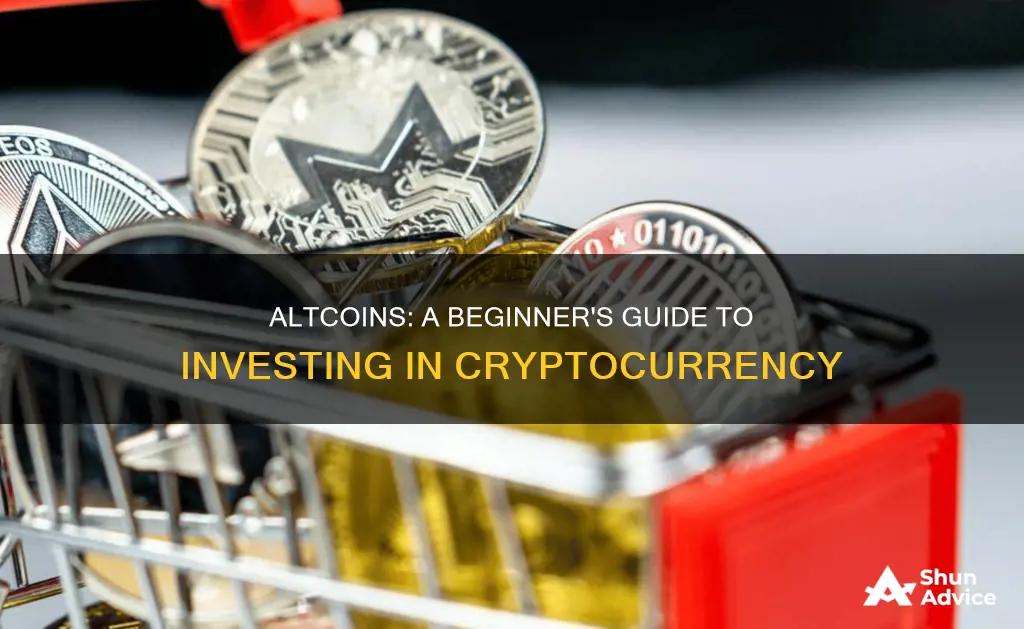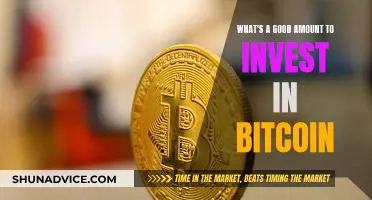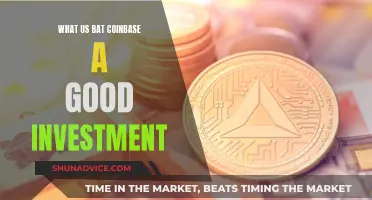
Altcoins are any cryptocurrency that is not Bitcoin (or Ethereum, according to some people). There are thousands of altcoins on the market, including tokens like Ethereum, Uniswap, Dogecoin, and Shiba Inu Coin. Altcoins can be thought of as variations of Bitcoin, created by developers to improve functionality or add features that are not present in Bitcoin.
If you want to invest in altcoins, you need an account with a cryptocurrency exchange. Most crypto exchanges support at least some altcoins, but the types of altcoins available to buy will differ depending on the exchange you choose. Some popular exchanges for altcoin investing include eToro, Gemini, Coinbase, Crypto.com, and Binance.
Before investing in altcoins, it's important to understand the risks involved. Altcoins are generally considered to be a high-risk, high-reward investment. The market is largely unregulated, and altcoins are very volatile, with the potential for sudden price swings and significant losses. It's crucial to conduct thorough research and only invest what you can afford to lose.
| Characteristics | Values |
|---|---|
| Definition | Altcoin is short for "alternative coin", referring to any cryptocurrency that is not Bitcoin, and sometimes not Ethereum. |
| Purpose | Altcoins are created by developers to improve upon the functionality of Bitcoin or add features that are not present in Bitcoin. |
| Examples | Ethereum, Cardano, Litecoin, Dogecoin, Shiba Inu Coin, Uniswap, Chainlink, Polkadot, Sushi, Aave, etc. |
| Risks | Altcoins are highly volatile and susceptible to scams and "rug pulls". They are also less liquid than Bitcoin and it is difficult to determine their use cases. |
| Investment Strategies | Research the altcoin project thoroughly, including the problem it solves, the necessity of decentralisation, the developers behind it, and the number of coins minted and in supply. |
What You'll Learn

Understanding the risks of altcoins
Altcoins are risky investments. They are highly volatile and susceptible to market crashes. There are thousands of altcoins on the market, and it is challenging to determine which are legitimate. Many are scams, and even those with strong fundamentals will struggle to catch up with Bitcoin.
Altcoins are also less liquid than Bitcoin, with a smaller investment market and fewer investors. They are difficult to buy, as they are often only available on certain altcoin exchanges.
Altcoins are subject to fraud and manipulation. They are unregulated, and your invested funds may travel overseas without your knowledge, making it hard for market regulators to pursue bad actors or recover funds.
Before investing in an altcoin, consider the following:
- What problem does this altcoin solve? If you can't figure this out, the project probably doesn't add much value to the market.
- Why does decentralisation help solve this problem? Using a blockchain where decentralisation is unnecessary can create inefficiencies.
- Who developed this project? Anonymously developed altcoins are fraudulent.
- How many coins will be minted/are in supply? An altcoin's price has little to do with its growth potential.
Given these risks, it is essential to do your research before investing in altcoins. Understand the blockchain technology behind the coin, the problem it aims to solve, and the team behind its development. Only invest in an altcoin that you understand and believe in.
LitecoinCash: A Smart Investment Move?
You may want to see also

Choosing an exchange
EToro:
EToro is a great choice for active investors who want to engage actively in the cryptocurrency market. It offers a unique social media platform that allows users to communicate and share trading ideas. eToro also has a simple interface, making it a good option for beginners. Additionally, its CopyTrader feature lets users mimic popular traders' portfolios.
Gemini:
Gemini is a good option for mobile users as it offers a sleek mobile app for iOS and Android, allowing users to manage their crypto on the go. Gemini offers bitcoin and 25 different altcoins. It also provides an insured wallet, protecting users from online security breaches.
Coinbase:
Coinbase is suitable for beginners with about 40 different altcoins to choose from. It has a unique feature that allows users to convert any altcoin into another altcoin automatically. Coinbase is a crypto brokerage, so it sets the prices of altcoins consistently with the market. It offers a website and mobile app and allows funding through bank transfers, credit cards, or cryptocurrency transfers.
Crypto.com:
Crypto.com is a platform that allows users to store, transfer, and exchange more than 90 cryptocurrencies. It offers a Crypto.com Visa Card, allowing users to spend their crypto anywhere Visa is accepted and earn up to 8% back. The platform provides 24/7 customer support and a simple verification process.
Binance:
Binance is a leading cryptocurrency exchange offering a wide variety of altcoins and trading pairs, including bitcoin, US dollars, and USDT (a stablecoin pegged to the US dollar). Binance also has its own token, BNB, which can be used to pay transaction fees. It offers margin trading and financial derivatives in certain regions.
Swapzone:
Swapzone is an aggregator that allows users to compare the offerings of different exchanges in one place. It supports 15 exchanges and over 500 currencies, making it easy to find the best deals without having to visit multiple platforms. Swapzone offers 24/7 live chat and email support.
Gold Coin Investment: Where to Buy?
You may want to see also

Setting up an account
Step 1: Choose a Cryptocurrency Exchange
Firstly, you need to select a cryptocurrency exchange platform to open an account with. Examples of popular exchanges include Coinbase, Binance, Gemini, Crypto.com, and eToro. Each platform offers different features, altcoin varieties, and trading pairs, so it's essential to research and choose one that aligns with your investment goals and preferences.
Step 2: Register and Verify Your Account
After selecting your preferred exchange, visit their website and look for an option to sign up or create an account. You will typically need to provide personal information such as your name, email address, and country of residence. Some exchanges may also require you to set up security measures, like two-factor authentication, during the registration process.
Once you have registered, the exchange will usually ask you to verify your account. This process may involve providing a government-issued ID, proof of address, or other documents to confirm your identity. The verification process helps exchanges comply with regulatory requirements and prevent fraud.
Step 3: Deposit Funds
After your account is verified, you can deposit funds into your account. Different exchanges offer various methods for depositing money, including bank transfers, wire transfers, credit or debit cards, or even other cryptocurrencies. Choose the deposit method that suits you best and follow the platform's instructions to complete the deposit process.
Step 4: Choose Your Altcoins and Place Orders
With your account funded, you can now start investing in altcoins. Browse the available altcoins on the exchange and research each project to understand its purpose, technology, and potential risks and rewards. Consider factors such as the altcoin's market cap, liquidity, and overall market trends when making your decisions.
Once you've identified the altcoins you want to invest in, you can place buy orders on the exchange. Specify the amount you want to invest, and the exchange will handle the transaction for you.
Step 5: Secure Your Investments (Optional)
If you plan to hold your altcoins for the long term, consider enhancing the security of your investments. Most exchanges provide digital wallets to store your altcoins, but you can also explore alternative options, such as hardware wallets or software wallets, for added security and peace of mind.
Explore the Best Cryptocurrencies to Invest in Now
You may want to see also

Researching individual altcoins
Start with a clean slate
Forget any "hot tips" you may have heard about a given altcoin and put aside any preconceived ideas or hopes about a particular coin. The goal here is to conduct an objective analysis, so it's important to approach the research with a fresh perspective.
Begin with the fundamentals
Conduct a fundamental analysis of the altcoin by examining its total supply and circulating supply. Consider whether the supply is in the millions, billions, or hundreds of billions, as this will impact the price of the coin. Additionally, look into the intended use case for the coin and evaluate whether it addresses a real-world problem or adds value to the market.
Skip technical analysis for now
At this stage, don't worry about technical analysis or reading charts for future price patterns. Instead, focus on understanding the underlying fundamentals and use case of the altcoin.
Put the coin to the test
Actively seek out negative news, reviews, and comparisons about the altcoin. Look for potential red flags, shortcomings, or issues raised by other investors. It's important to consider both the positive and negative aspects of the coin to make an informed decision.
Watch the price action
Once you've identified a potential altcoin to invest in, monitor its price action on a chart for a week or so. Look for support and resistance levels, buying and selling volume, and any unusual patterns that could indicate manipulation or pump-and-dump schemes.
Take your time
Investing in cryptocurrencies carries inherent risks, so it's crucial to thoroughly research an altcoin before investing. Approach potential investments with a sense of skepticism and be wary of FOMO (fear of missing out). It's better to take your time and make informed decisions rather than rushing into risky investments.
Smart Strategies: SMSF Bitcoin Investment Options
You may want to see also

Knowing the market
The cryptocurrency market is a highly volatile and speculative investment arena. Altcoins, or alternative coins, are any cryptocurrencies other than Bitcoin and sometimes Ethereum. There are thousands of altcoins on the market, and more are being created all the time. As such, it is a complex and dynamic market to navigate.
Firstly, it is important to understand the differences between Bitcoin and altcoins. Bitcoin was the first cryptocurrency, and it has set the standard for how these projects should operate. It has the strongest track record and has shown an ability to withstand market crashes. It also has the highest market capitalisation and is the most traded cryptocurrency. Altcoins, on the other hand, are often created by developers who want to improve upon Bitcoin's functionality or add new features. They may have specific purposes, such as improving transaction speed, or facilitating peer-to-peer transactions and application development.
When considering investing in altcoins, it is crucial to do your research and understand the unique characteristics of each coin. Ask yourself: What problem does this coin solve? Why does it need to be decentralised? Who are the developers, and are they credible? Understanding the underlying technology and purpose of each altcoin is essential.
It is also important to be aware of the risks involved. Altcoins are generally riskier than investing in Bitcoin. They are more volatile and prone to sudden price swings. The market is largely unregulated, and many altcoins are scams or fail to gain traction. Reputation risk, market access risk, and technical risk are all factors to consider.
Additionally, the vast number of altcoins available can make it challenging to choose which ones to invest in. Smaller market cap altcoins tend to be more volatile, and it can be difficult to predict which coins will have staying power.
When investing in altcoins, it is crucial to only invest what you can afford to lose. It is a highly speculative market, and there is a high probability that many altcoins will eventually fade away.
Kok Coin: A Smart Investment Decision?
You may want to see also
Frequently asked questions
Altcoins are any cryptocurrencies other than Bitcoin (and, to some, Ethereum). They are alternative versions of Bitcoin, created to improve functionality or add features that are not present in Bitcoin.
You need an account with a cryptocurrency exchange to get started. Some exchanges let you trade altcoin-bitcoin pairs, meaning you can buy and sell altcoins using bitcoin. Most crypto exchanges support at least some altcoins, but the types of altcoins you can buy will differ depending on the exchange.
Altcoins are considered highly volatile and speculative investments. They are also unregulated, making them more susceptible to scams and "rug pulls". Altcoins can be extremely volatile, with sudden price swings and the potential for significant losses.







